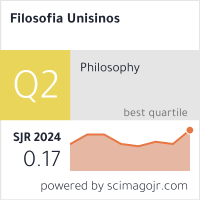Duns Scotus’s Theory of Common Natures
Resumen
This paper looks at some of Duns Scotus’s innovations in the theory of common nature. Scotus criticized the dominant scholastic theory of universals, according to which natures are of themselves individual but are somehow correctly conceived by the mind as universal, and developed a more clearly realist theory by appropriating and developing Avicenna’s theory. I discuss Scotus’s arguments for this lesser unity, and look at how the lesser unity is accounted for in his metaphysics. I also discuss Scotus’s formal distinction and his account of the relationship between conceptual thought and reality. I try to show that good sense can be made of Scotus’s theory, and that the rather extravagant metaphysics that it involves might be justified, given how much explanatory work the theory can do.
Key words: Duns Scotus, universals, common nature, formal distinction.Descargas
Métricas
Descargas
Publicado
Cómo citar
Número
Sección
Licencia
Concedo a revista Filosofia Unisinos – Unisinos Journal of Philosophy o direito de primeira publicação da versão revisada do meu artigo, licenciado sob a Licença Creative Commons Attribution 4.0 (que permite o compartilhamento do trabalho com reconhecimento da autoria e publicação inicial nesta revista).
Afirmo ainda que meu artigo não está sendo submetido a outra publicação e não foi publicado na íntegra em outro periódico e assumo total responsabilidade por sua originalidade, podendo incidir sobre mim eventuais encargos decorrentes de reivindicação, por parte de terceiros, em relação à autoria do mesmo.










